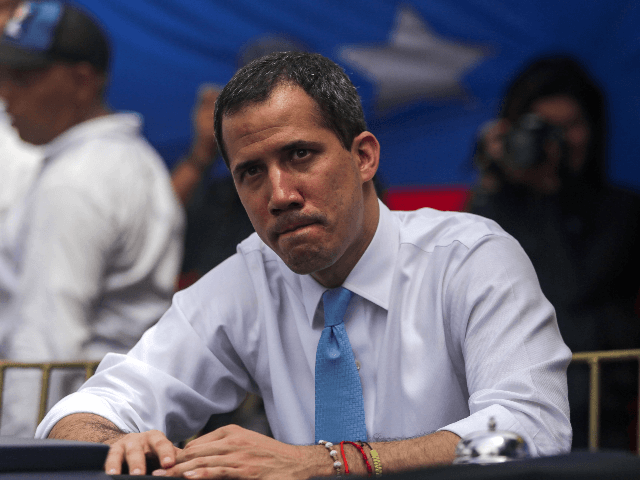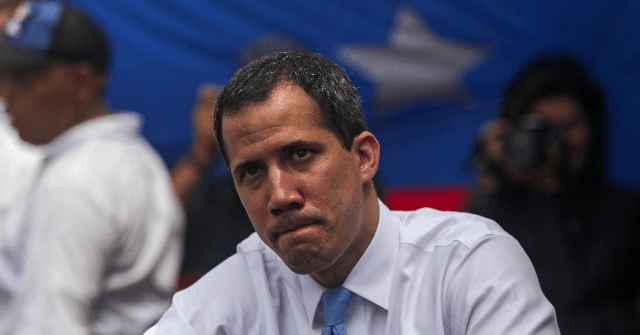
A national poll of Venezuelans released this week found that about 88 percent of the country does not recognize Juan Guaidó as its president despite his constitutional status as such, a reflection of the little Guaidó has managed to accomplish since assuming the office.
Venezuela’s socialist dictator Nicolás Maduro controls the Armed Forces of Venezuela, the nation’s police units, and its lucrative oil and gold deposits. Functionally, Maduro runs the country, but his last legal term as president expired in January 2019. At the time, the nation’s anti-chavista opposition used a constitutional provision that grants the National Assembly, the federal legislature, the power to appoint an interim president in the event of a “rupture in the democratic order.” Lawmakers inaugurated Guaidó as president.
Guaidó at the time of his inauguration was a member of the political party Popular Will, a full member of the Socialist International. The leader of that party, Leopoldo López, is currently in exile in Spain, attempting to organize a coalition around his party to negotiate “talks” with the Maduro regime.
Most of the free world acknowledges the legality of Guaidó’s claim to the presidency and many countries, including the United States, consider his diplomats the legitimate representatives of the country. Other than a brief period in May 2019 in which he claimed the military had turned on Maduro, however, Guaidó has not exercised any presidential powers other than appointing ambassadors to friendly states.
The popular goodwill Guaidó enjoyed in the immediate aftermath of his inauguration has largely waned, the results of a survey by the polling firm Meganálisis revealed this week. The poll was conducted between June 23 and June 30, collecting responses from all 23 states in Venezuela and the capital district in Caracas.
Asked, “Is Juan Guaidó the president of Venezuela?” only 6.8 percent said “yes.” Most respondents, 87.9 percent, said no. Another 5.3 percent, almost as many as those who answered affirmatively, said they did not know. The number is nearly identical to those who answered “no” to a similar question in a Meganálisis poll published in February, which asked not if the individual considered Guaidó their president but if his administration “exists.”
The poll also revealed profound distrust in López, allies like longtime Maduro opposition leader Julio Borges, and political parties in general. Asked, “do you think Leopoldo López and Julio Borges represent the true feelings and thoughts of the majority of Venezuelans in the country?”, a similar majority said “no”: 82.3 percent.
In general, over half of the country, 69.2 percent, said they did not “believe in, trust, or campaign for” any political party at all. One in five said yes, most of them members of Maduro’s United Socialist Party of Venezuela (PSUV).
Rubén Chirino Leañez, the vice president and CEO of Meganálisis, told Breitbart News that the poll revealed the credibility of political parties in general in Venezuela was “calamitous,” suggesting a connection between relatively high rates of participation in the PSUV and the fact that the ruling party can offer free food, threaten to fire people who are not loyal to it from government jobs, and other coercive factors. In 2016, Maduro launched a program called the Local Committees for Supply and Production (CLAP) that offers boxes of food to socialist allies. While many of those boxes, witnesses complained, came with rotten food and infested with insects, food security in Venezuela is so rare that many impoverished Venezuelans go out of their way to obtain the boxes as a way to avoid scavenging for food in the garbage.
Chirino blamed the collapse in trust in political parties as an institution on socialism generally, which is the governing philosophy of several opposition parties, including Guaidó’s former ideological home.
“This debacle for the political credibility of parties has as its common factor the socialist profile of the great majority of these political parties,” Chirino said, observing another result from the June poll: “71.2 percent of Venezuelans do not believe that socialism can solve the crisis the country is enduring.”
Chirino added that he believed that outside forces supporting Guaidó, given his diminished support at home, “profoundly weakens, before Venezuelans, their credibility.”
López is currently leading a group of anti-Maduro socialists spearheading efforts to involve the European Union and other third parties in what Guaidó has branded the “Accord for National Salvation,” a new round of dialogue with the Maduro regime. Guaidó is seeking dialogue with the Maduro regime to hash out the details of the accord, but is essentially proposing to trade the establishment of free and fair elections, presumably run by Maduro, for amnesty for Maduro’s top cronies for committing years of human rights atrocities. The deal has attracted the support of several prominent chavistas and other leftists in the country and Guaidó has not dismissed the possibility of running in a future election held by the Maduro regime. Guaidó insisted this week, however, that any future election must meet the standards of the European Union for him to participate. He is seeking to organize elections by November 21.





